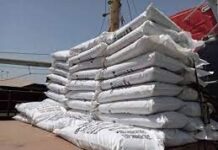LIFE OF THE RURAL PEOPLE
with Abdoulie Dibba
CHIEF RESPONDS
This Column is meant to monitor and report on issues that concern the people of the rural area in terms of how  they are facilitating or hindering their development.
This Column has been bringing to the attention of the readers the challenges faced by the rural women and what they have been doing toward addressing them from the time when the Gambia attained sovereign status in April 1970 to date.
In the last edition, it was indicated that the women, young and old, are facing a lot of challenges in rural Gambia and that being caregivers, they are taking care of their old parents, husbands, children and grandchildren.
It was shown that most of them do not even have enough to take care of their own needs due to the level of poverty in the rural area and as a result, they risk their health in order to put food on the table by working under the burning sun without sunscreen on the farm or garden, processing food, fetching water or doing laundry.
With no employment opportunities in Rural Gambia other than the farm, poverty is taking a dramatic toll on the people living there.
Upon all these, women lack ownership right over land and do not belong to the District Tribunal in which issues within their locality are addressed.
It is therefore essential that the needs of women in rural communities are recognised and addressed in order to give meaning to Women Empowerment.
On that note, Women’s rights defenders, have a lot of work to do before they can bridge the gap of unequal access to women’s rights in Gambia.
This is precisely the reason why AAITG Governance and Partnership Unit in collaboration with Agency for the Development of Women and Children (ADAWC) picked up the issue of women being denied control and ownership of land based on unfair cultural misconceptions among some quarters as well Women inclusion in the District Tribunal as issues worth campaigning and therefore engaged Activista.
On the 11th of June, an interface was created in which 20 village heads, the Deputy Governor, representatives of the Gender Action Groups and Rural Women Assemblies came together to discuss and clarify the misconception that impede women ownership and control over land and inclusion in the district tribunal at Jurufeh Bantaba.
In that interface, the women communicated to their local authorities in the form of a drama, in which they demanded for their inclusion in the District Tribunals noting that most of them cannot express themselves in the midst of men when they are violated particularly in their marital homes.
“We are demanding to be included in the District Tribunals because there are issues that affect us the women that can only be explain to or addressed by women”.
The women went further to demand not only for access, but ownership and control over land, asserting that “if we are to solve hunger and reduce poverty, it is vital that we the women smallholder farmers and other marginalized rural women are given the required support needed for our production”.
In responding to the demands of the women, Chief Momodou Chatty Cham asserted that he has carefully followed the drama and understood clearly the issues raised by the women.
With regard to land ownership, Chief Cham indicated that that issue is complicated as it is govern by culture, tradition and religion which they have to be very careful in dealing with it.
“We need to be careful with women ownership of land because land is govern by our culture and tradition supported by our religion” stated Chief.
With regard to women inclusion in the District Tribunals, Chief Cham stated that that is applicably taking into consideration that “we have women Alkalolu, Women Governor, Women Minister, it is possible to have women in District Tribunals” he said.
The district chief informed the women that if he has the authority from the Governor’s Office who is his immediate boss, he would include women in his District Tribunal as that would ensure efficiency in the dispensation of Justice as there would not have been any gender barrier.
He however requested the drama team to go to his village and perform the drama before his District Tribunal Members.
The request was accepted and ADWAC and Actionaid promised to contact their offices to foot the bill.
]]>
they are facilitating or hindering their development.
This Column has been bringing to the attention of the readers the challenges faced by the rural women and what they have been doing toward addressing them from the time when the Gambia attained sovereign status in April 1970 to date.
In the last edition, it was indicated that the women, young and old, are facing a lot of challenges in rural Gambia and that being caregivers, they are taking care of their old parents, husbands, children and grandchildren.
It was shown that most of them do not even have enough to take care of their own needs due to the level of poverty in the rural area and as a result, they risk their health in order to put food on the table by working under the burning sun without sunscreen on the farm or garden, processing food, fetching water or doing laundry.
With no employment opportunities in Rural Gambia other than the farm, poverty is taking a dramatic toll on the people living there.
Upon all these, women lack ownership right over land and do not belong to the District Tribunal in which issues within their locality are addressed.
It is therefore essential that the needs of women in rural communities are recognised and addressed in order to give meaning to Women Empowerment.
On that note, Women’s rights defenders, have a lot of work to do before they can bridge the gap of unequal access to women’s rights in Gambia.
This is precisely the reason why AAITG Governance and Partnership Unit in collaboration with Agency for the Development of Women and Children (ADAWC) picked up the issue of women being denied control and ownership of land based on unfair cultural misconceptions among some quarters as well Women inclusion in the District Tribunal as issues worth campaigning and therefore engaged Activista.
On the 11th of June, an interface was created in which 20 village heads, the Deputy Governor, representatives of the Gender Action Groups and Rural Women Assemblies came together to discuss and clarify the misconception that impede women ownership and control over land and inclusion in the district tribunal at Jurufeh Bantaba.
In that interface, the women communicated to their local authorities in the form of a drama, in which they demanded for their inclusion in the District Tribunals noting that most of them cannot express themselves in the midst of men when they are violated particularly in their marital homes.
“We are demanding to be included in the District Tribunals because there are issues that affect us the women that can only be explain to or addressed by women”.
The women went further to demand not only for access, but ownership and control over land, asserting that “if we are to solve hunger and reduce poverty, it is vital that we the women smallholder farmers and other marginalized rural women are given the required support needed for our production”.
In responding to the demands of the women, Chief Momodou Chatty Cham asserted that he has carefully followed the drama and understood clearly the issues raised by the women.
With regard to land ownership, Chief Cham indicated that that issue is complicated as it is govern by culture, tradition and religion which they have to be very careful in dealing with it.
“We need to be careful with women ownership of land because land is govern by our culture and tradition supported by our religion” stated Chief.
With regard to women inclusion in the District Tribunals, Chief Cham stated that that is applicably taking into consideration that “we have women Alkalolu, Women Governor, Women Minister, it is possible to have women in District Tribunals” he said.
The district chief informed the women that if he has the authority from the Governor’s Office who is his immediate boss, he would include women in his District Tribunal as that would ensure efficiency in the dispensation of Justice as there would not have been any gender barrier.
He however requested the drama team to go to his village and perform the drama before his District Tribunal Members.
The request was accepted and ADWAC and Actionaid promised to contact their offices to foot the bill.
]]>




















